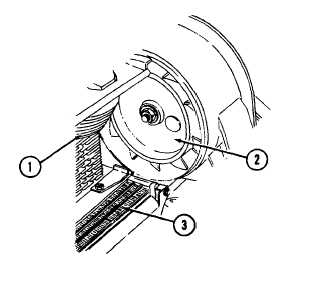|
| |
TM 5-4320-305-10
2-9.
OPERATION IN EXTREME HEAT (Continued)
c.
Cylinder cooling fins (1). Cylinder cooling
fins should be free of dirt.
d.
Bottom roller (2). Bottom roller should be
free of dirt.
e.
Lube oil cooler cooling fins (3). Lube oil
cooler cooling fins should be free of dirt.
f.
Air cleaner. High ambient temperatures change density of air used by the engine in combustion. Monitor
engine's ability to breathe using the air cleaner intake restriction indicator. Air filter elements should be changed at first
indication of unacceptable restriction of air flow.
WARNING
Death or serious injury could occur if diesel fuel oil is not handled carefully. Use in a well-
ventilated area away from open flame, arcing equipment, ignition sources, heaters, or excessive
heat. Be certain that fuel lines and connections are secure. Do not inhale vapor. Do not overfill
fuel tank. Engines must be turned off and cooled before refueling. Use proper refueling
procedures and equipment to avoid spillage. Do not run engines near open fuel containers. DO
NOT SMOKE.
g.
Fuel. Fill the fuel tank at the end of each day of operation in order to prevent an accumulation of vapor in
the fuel tank. However, do not overfill. Allow room for fuel expansion.
h.
Batteries. Increase battery PMCS frequency. Use distilled water or a good grade drinking water (excluding
mineral water) to bring electrolyte to proper level.
2-10.
OPERATION IN RAINY OR HUMID CONDITIONS
WARNING
Death or serious injury could occur if diesel fuel oil is not handled carefully. Use in a well-
ventilated area away from open flame, arcing equipment, ignition sources, heaters, or excessive
heat. Be certain that fuel lines and connections are secure. Do not inhale vapor. Do not overfill
fuel tank. Engines must be turned off and cooled before refueling. Use proper refueling
procedures and equipment to avoid spillage. Do not run engines near open fuel containers. DO
NOT SMOKE.
a.
Check that fuel tank filler cap is tight and gasket is not tom. Fill fuel tank immediately after every operating
period to prevent condensation.
Change 2 2-80
|

